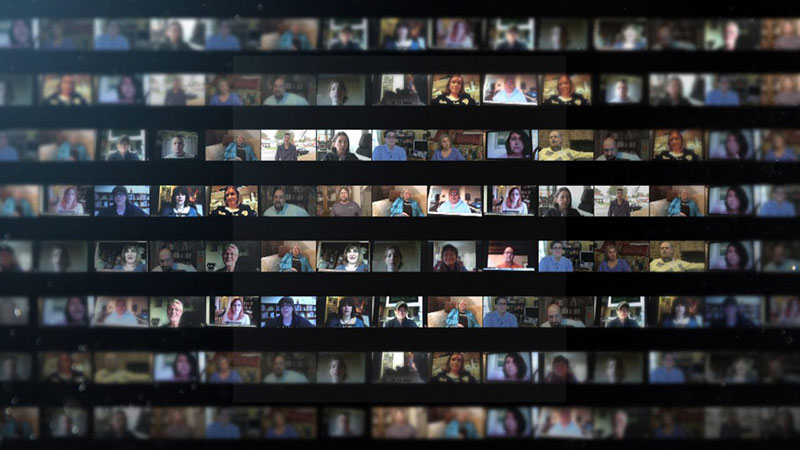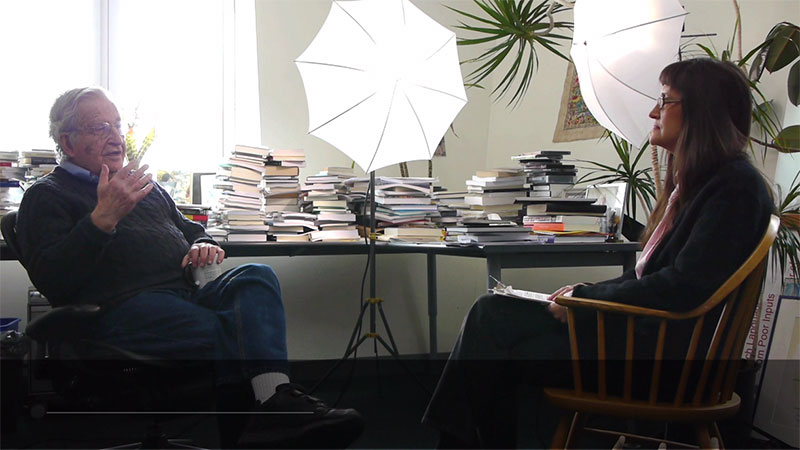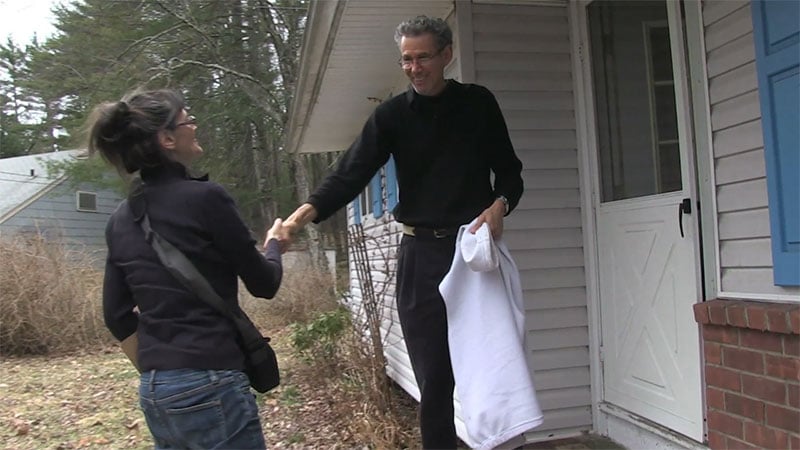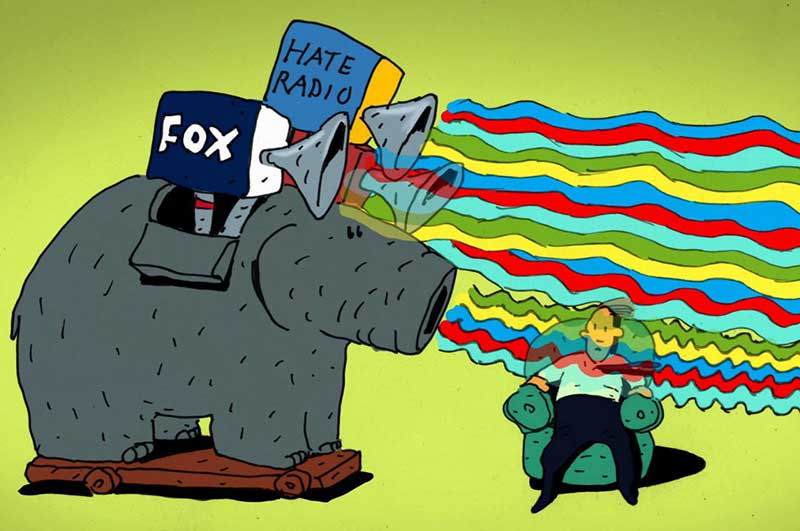“In almost every act of our lives, we are dominated by the relatively small number of persons who understand the mental processes and social patterns of the masses. It is they who pull the wires that control the human mind.” – Edward Bernays, Propaganda.
So begins Jen Senko’s award-winning documentary The Brainwashing of My Dad, which attempts to reveal the rise of the right wing media through the personal lens of the her relationship with her father. In showing the personal tragedy of how her family was divided by ideological divisions, The Brainwashing of My Dad also shows how the social fabric of a nation has been torn apart.
I ask Jen about how her father became angry and unreachable after he began to listen to Rush Limbaugh, and then to Fox news.
“It was actually painful for our whole family. Never did we imagine that our dad would change as radically and as dramatically as he did. At one point my older brother–this isn’t in the movie–he said he felt like the entire family was just coming apart.”
“To see him become hateful and angry, was just antithetical to what we knew about him. It did become almost like he was in a cult because he became evangelical… He never emailed us to say ‘Hi, how are you? What’s going on in your life?’ It was always ‘Clinton’s evil.’ Or ‘Democrats are evil.’ Or ‘Did you know that the minimum wage is awful?’
Having directed two documentaries previously, Road Map Warrior Women and more recently, The Vanishing City, about the politics behind property development in New York City, it was natural for Senko to explore what happened to her father through a documentary. A freelance artist in New York city that worked previously at Smith Barney as a VP, she pondered how to make a living while making the film. A friend, documentarist Karen Kramer, advised her simply to raise money for the film: “And a light went off in my head, and I just said, You know, if it can be done, then I’m going to do it.”

Senko used her savings of $10,000 to start a Kickstarter fundraising campaign, making a trailer and doing some initial interviews. Her campaign harnessed the online platform’s powerful potential to connect filmmakers with their community. Almost a thousand supporters contributed to the film. Senko jokes that she became a sort of Ann Landers to many who reached out with their own stories.: “People just started coming out of the woodwork saying, ‘Oh, that happened to me.’ ‘My father won’t talk to me anymore.’ ‘My mother used to be a feminist; she’s unreachable.’ ‘My brother, my sister…’
She says she still receives letters everyday: “It’s heartbreaking some of the letters you get. That confirmed to me this is a phenomenon. And this is much bigger than just me, my dad, my family…[it was] happening to this country. This whole nation of families being divided.”
The film features Skype interviews with the ordinary people she connected with through Kickstarter, who relate their own tales of families torn apart: one woman describes having a gun pulled on her by her uncle.
_3.jpg)
Senko credits Kickstarter connecting her with Matthew Modine, who ended up narrating and co-producing the film: Her college friend, animator Bill Plympton was running a Kickstarter campaign at the same time. Alexi Anastasio, who helped Senko with her campaign, suggested she ask Plympton for a mention: “She said…why don’t you ask him if he can ask Adam who’s running it to mention yours, to give yours a boost. “And I said, “Who’s Adam?” And she said, ‘Just call Bill and tell him you know Adam and ask if Adam wants to do that.’ So I did. Bill calls me up and he says, ‘So Jen, how do you know Adam?’ I’m like “Oh! [laughs] Through um…Facebook.”
Adam as it turns out, was Adam Rakoff, who runs production company Cinco Dedos Peliculas with Modine: “Next thing I know, I’m hearing that Matthew Modine wants to be involved, and I’m like, ‘Holy cow!’ Because I’ve always admired him. He’s such an ethical, just a pure soul and a good person.”
Having made the decision to make the film, Senko then found people coming to her aid “sort of miraculously.” A friend of Senko’s, asked ‘Why don’t you interview Noam?’ I’m like, ‘Noam Chomsky? Wow! Sure!’ So, I typed him up a letter, ‘Dear Mr. Chomsky, this is my proposal.’” Chomsky agreed, and connected her with Edward S. Herman, who co-authored Manufacturing Consent, as well as media critic Jeff Cohen, who was “pivotal” as someone who “actually was on Fox as the progressive voice.” Cohen in turn connected her with Steve Rendall, with whom he started the media watchgroup FAIR (Fairness and Accuracy in Reporting). She also interviews one-time conservative David Brock of Media Matters, cognitive linguist George Lakoff, Republican political consultant Frank Luntz, and CNN Founder Reese Schonfeld, among others.

Senko covers five decades of the history of the right-wing media in 90 minutes, beginning with the role of the anti-communist, anti-government John Birch Society (of which Charles Koch, father of the Koch brothers, was a founder) during Barry Goldwater’s disastrous election run.
The right fought back, Senko argues, in reaction to the burgeoning women’s rights, civil rights and anti-war movements. Roger Ailes, former CEO of Fox and inventor of the sound bite, was believed to have authored the memo How to Get GOP on Television News when he was an advisor to Nixon: “In it he describes how people are dumb; they’re lazy; they want their thinking done for them. So it really was sort of the blueprint for Fox.” And the 1971 secret memo, “Attack on American Free Enterprise System,” by Lewis Powell, outlined the need for an infrastructure to promote free market ideology and constant surveillance of the media. Its impact was felt “in universities, in the pulpits, in literature, all over,” Senko notes. “It was tremendously successful. That’s when think tanks started exploding.”
If these strategies laid the groundwork for a right-wing media, two legislative acts helped potentiate them: The 1987 elimination of the Fairness Doctrine, and the 1996 Telecommunications Act. The Fairness Doctrine was an FCC policy requiring broadcast licensees to present “contrasting viewpoints on controversial issues of public importance.”

“Sue Wilson, who created another media documentary before mine called Broadcast Blues…she actually shows examples of what happens when you don’t have a Fairness Doctrine, and [news is] not local…There’d be fires in a neighborhood and nobody would know about it, because it was national radio program.”
“Reagan got rid of that, then talk radio exploded the very next year; [and] you have someone like Rush Limbaugh come on the scene nationally.”
The Telecommunications Act, which Senko describes as “monumental,” loosened restrictions on the mergers and acquisitions of different media industries. “Six months later, Rupert Murdoch founded FOX,” she smiles. “And hired Roger Ailes.”
Senko admits “a lot of this stuff is kind of wonky.” The film features colorful illustrations by the King of Indie Animation, Bill Plympton, a friend of hers from college days: “I tried to make it [so that people would say] “Oh, I would get that.”
In a fascinating sequence during the movie, Senko observes that it seemed her dad was addicted to being angry and “couldn’t wait” to be by himself to listen to Rush Limbaugh.She interviewed Oxford neuroscientist Dr. Kathleen Taylor, who explains that contrary to the stereotypes of bainwashing we see, there’s implicit brainwashing by limiting access to alternate viewpoints. Jen’s family, they found that by weaning their father off of the anger-inciting news outlets helped him to regain his former, gentler self.
Senko also interviewed Dr. John Montgomery of SUNY, who explains how anger is a stress response that releases endorphins, the main source of pleasure in the brain. “Which is kind of why we like scary movies, right? There’s a little bit of –I don’t know if I’d call it pleasure– but excitement in that. People get excited. That part of it feels good, that part of it also can be–addictive.”
“That’s why Donald Trump is the GOP nominee today. He listened to talk radio. He got his talking points from there. If you notice and I’m sure you have, he doesn’t really have anything of substance to say. But he hits all those notes that resonates with people emotionally. And they’re like, “He knows how I feel.”
I ask Senko about anger on the left, such as that directed at Hillary Clinton. “I think that’s a fair thing to wonder and ponder…The problem with the right is that a lot of the information is lies. There’s a Fairleigh Dickinson University study that showed that people that listened to Fox know less than people that watch no news at all. And 67% of Republicans still believe there were weapons of mass destruction. I mean, there are things to get angry about.”
“You kind of have to balance it out on the left too. Because there’re different factions. And I think, yes we have disagreements, but we need to unite. That was one way the right got so powerful. We on the left side of things don’t seem to get that. I mean, look at Grover Norquist with his Wednesday meetings, as long as you believed in what he called babies, guns, and taxes, the anti-abortion, pro-gun, and no taxes, you could come under their big umbrella.”

Senko says her fantasy would involve labeling: “To have some kind of legislation that would not allow networks to call themselves news, if they had a certain amount of opinion.” Like Fox is so blatantly opinion. They inject their opinion into everything…Because they’re allowed to lie, they’re actually allowed to lie. Somebody that worked at Fox years ago sued them because they made him lie. And then they took it to the Supreme Court, and then in the Supreme Court, with Scalia on there–’No, that’s your free speech, they’re allowed to lie.’”
I ask Senko about how you talk to people when there seems to be less and less of a common ground. She tells me about the work of HearYourselfThink: “They’re amazing. They’re like the Ghostbusters of deprogramming…They talk to people coming out of either Trump townhalls or Glenn Beck townhalls. They just start by asking them questions and getting to a place where they have some mutuality. So that you realize, you’re in the same tribe. Like, you have kids, yeah, you know, we’re worried about the kids.”
Senko has also fielded e-mails from the right, and talks about trying to move conversation to a common ground: “Sometimes if you just question them like, ‘Well, how would that work? what do you think about that? And take it to the next level, sometimes you can break through.”
“Sometimes people on the right will write me. Somebody wrote me the other day and was sort of accusing me of all of this stuff. And I realized that he’s just generalizing what he’s been taught what a liberal is. I said, you know, go see the movie. It’s only 99 cents now on iTunes. And then, after you see the movie, and you want to comment to me about the movie, I’ll write back to you. And I’ll listen to anything you have to say. But right now you’re just talking in generalizations. I mean, some people are really, just hideous jerks, saying awful things. You can’t talk to them. But when someone is like really kind of attempting to try and talk to you, I just kind of talk back. I’ve had a lot of luck with that, believe it or not. I think I’m kind of getting good at it!” she laughs.
Twitter: @Jen_Senko
www.thebrainwashingofmydad.com
Page created on 6/5/2017 6:11:06 PM
Last edited 2/24/2021 11:43:13 PM
